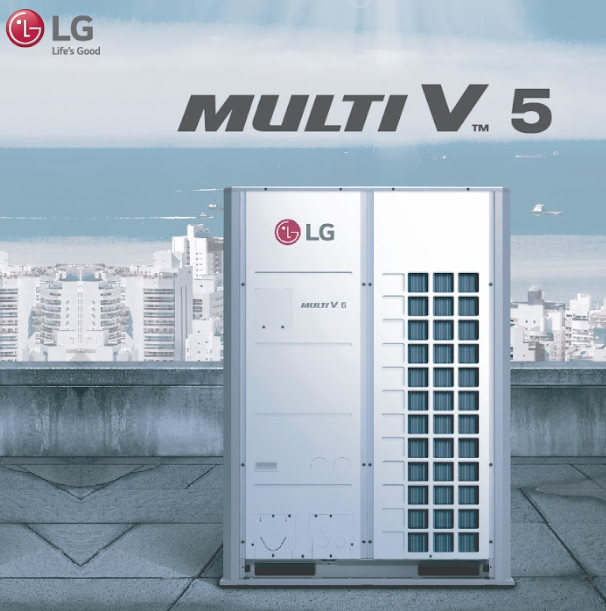Keep your work environment safe with LG Duct UVnano Filter Box

June 15, 2022 7:45 p.m.
Businesses are slowly coming back to life. Lockdown restrictions have been lifted and COVID vaccines have become more accessible and commonplace. For better or for worse, RTO or return to office is the current buzzword.
As employees now prepare to return to work in their offices, employers and building owners are now facing the challenge in ensuring everyone’s safety and curb the potential Covid-19 outbreak, as the threat of Covid-19 should be dealt with seriously.
The need to improve indoor environments not only relates to comfort and convenience but also takes indoor air quality into consideration.
To meet this need, LG has developed the LG Duct UVnano Filter Box. This new innovation is a complementary product that is installed at the return air side of the unit and aims to clean indoor air and improve air quality.
LG Duct UVnano Filter Box consists of three main components: pre-filter, UVnano (UVC LED), and MERV 13 filter (ePM1 50% filter).
The filters are both accessible either from the side or the bottom of the unit.
The pre-filter is the first component and it traps larger dust particles.
They prevent the MERV-13 filter from getting clogged with larger particles so that it can filter smaller pollutants more efficiently.
The pre-filter doesn’t need replacement and can be washed and re-used.
The second component is the UVnano LEDs.
These UV LEDs shoot UVC (or ultraviolet type C) beams of light on the pre-filter and disinfect it.
The LEDs are tilted with an angle to shoot in the direction of the pre-filter, which is placed in front of the MERV-13 filter.
The UVnano has a 99.99% sterilization capability against bacteria and viruses parasitized on bacteria, and it can be used semi-permanently without the need to be replaced.
The third component of the filter is a 2-inch thick MERV 13 filter.
This filter has an ISO 16890 classification of ePM1 50%.
This filter can trap at least 50% of the PM1 dust particles in the air passing through it.
Particles as small as 0.3μm in diameter can be sufficiently trapped, cleaning and providing healthier air indoors.
According to American Society of Heating, Refrigerating and Air-Conditioning Engineers (ASHRAE) recommendations, MERV 13 is the minimum filter grade for non-healthcare facilities to reduce airborne infectious aerosol exposure.
The filter is replaced after 960 hours of operation. The user is notified of the replacement time through an alarm from the wired remote control.
LG’s revolutionary UVnano technology has been a key innovation during the height of COVID19. It is used in the South Korean brand’s top-of-the-line air-conditioners, air-purifiers, and even the wearable mask.
The ultraviolet light emitted kills bacteria and potential pathogens. UVC is completely absorbed by the ozone layer in the atmosphere and it is germicidal.
It can disrupt micro-organisms’ ability to reproduce by causing chemical changes in the nucleic acids that form their RNA and DNA.
Upgrade your commercial air-conditioners to meet the needs of the future with LG. For inquiries, visit https://www.lg.com/ph/business/inquiry-to-buy.

TECHNOLOGY
TECHSHAKE announces strategic business alliance with Mirai Works

6:00 p.m. July 18, 2024
TECHSHAKE PTE. LTD., headquartered in Makati City, Philippines, with a branch office in Singapore, is pleased to announce that it has entered into a business alliance agreement with Mirai Works Inc., headquartered in Minato-ku, Tokyo, a professional-focused human resource service provider in Japan.
This alliance aims to provide support for the growth and market entry of startups in Japan and Southeast Asia.
TECHSHAKE’s Business
TECHSHAKE’s vision is to expand the startup ecosystem in Southeast Asia, with a focus on the Philippines, and to connect Southeast Asia with the world.
TECHSHAKE (Kotaro Adachi, CEO & Co-Founder) manages and runs the Philippines’ premier innovation conference “IGNITE” in collaboration with dentsu X, a subsidiary of Dentsu Inc. and a provider of integrated media planning, branding, and marketing services. Furthermore, TECHSHAKE operates media platforms, matches startups with established companies and investors, and provides essential support for startups to thrive.
TECHSHAKE is committed to fostering a global environment for business development in the Philippines.
TECHSHAKE is dedicated to nurturing the startup ecosystem in Southeast Asia by connecting entrepreneurs with the necessary resources and networks to succeed. With a strong presence in the Philippines and extensive experience in supporting startups, TECHSHAKE aims to bridge the gap between Southeast Asia and global markets.
Mirai Works (Nagaharu Okamoto, CEO & Co-Founder) is driven by a mission to empower individuals to embrace challenges that shape the future of Japan. Their vision is to cultivate an ecosystem where professionals thrive, regardless of traditional work structures. They are developing a business to provide opportunities for professionals to navigate changes throughout their careers and to support them in the midst of diverse career paths, including independence, entrepreneurship, side businesses, and full-time employment.
Mirai Works’ initiatives aim to provide resources for individuals to succeed in an evolving work landscape, fostering innovation and growth.
In May 2023, Mirai Works launched “Booster,” (https://booster.mirai-works.co.jp/) a startup support platform aimed at empowering professionals to start and scale their businesses. Booster facilitates growth through acceleration programs, providing information regarding startup ecosystem events and pitch competitions, and personalized mentorship, ensuring startups have access to critical resources for success.
In this collaboration, TECHSHAKE will leverage its expertise and network to support Japanese startups looking to enter the Southeast Asian market. Mirai Works, known for its professional human resource services and startup support platforms, will enhance TECHSHAKE’s efforts by providing hands-on support in various aspects of business promotion. This partnership underscores Mirai Works’ commitment to facilitating cross-border collaboration and growth opportunities for startups in Japan and Southeast Asia.
Details of Cooperation
Not only does Mirai Works support startups registered with Booster, but it also offers a service called “Free Consultant,” (https://freeconsultant.jp/) a freelancer business matching platform. Through Free Consultant, Mirai Works plans to connect highly skilled professionals with Southeast Asian startups supported by TECHSHAKE. Mirai Works provides hands-on support in various aspects of business promotion, including management strategy planning, marketing and PR, IPO preparation, and M&A activities, to drive business growth. Furthermore, Mirai Works will collaborate with TECHSHAKE to hold acceleration programs and offer support for overseas expansion.
Entertainment
Exclusive for Smart Subscribers: Unlock Lionsgate Play for free starting July 18

1:30 p.m. July 17, 2024
It’s the golden age of entertainment, but with so many streaming services offering a vast range of content, it can be challenging to decide which one to subscribe to. That’s why Lionsgate Play is making the decision easier with their exclusive 7-day free trial, letting Smart Mobile subscribers explore a world of premium content without spending a centavo.
“We’re excited to lead Smart Mobile subscribers into the world of Lionsgate Play’s premium content with this 7-day free trial,” stated Rohit Jain, President – Lionsgate Play, Asia. “Our objective is to inspire and captivate viewers, leading them to discover our relatable, edgy, bold and compelling content.”
“At Smart, we are committed to providing our subscribers with easy access to top-notch entertainment,” said Alex O. Caeg, Head of Smart Consumer Wireless Business. “This collaboration with Lionsgate Play aligns perfectly with our mission to give our customers more value.”
What is Lionsgate Play?
Lionsgate Play offers a streaming experience that’s hard to match. It’s got an extensive library filled with blockbuster movies and critically acclaimed TV shows. From timeless classics to the latest releases, Lionsgate Play has it all. Plus, enjoy exclusive content you won’t find on other streaming platforms, such as A24’s highest-grossing horror flick Talk to Me and Liam Neeson starrer Blacklight amongst others.
How to Avail the 7-Day Free Trial
This promotion is exclusively for Smart Mobile prepaid and postpaid subscribers who have not subscribed to Lionsgate Play in the past. Here’s how you can get started with your 7-day free trial:
1. Visit the Lionsgate Play website.
2. Register using your email address or mobile number and create a password.
3. Go to the Subscription page and choose “SMART” as your mode of payment.
4. Select your subscription plan:
o Php99 for a monthly plan
o Php199 for a quarterly plan
5. Enter your mobile number and proceed to the checkout page.
6. You’ll receive a One-Time Password (OTP) via SMS.
7. Enter the OTP to activate your free 7-day trial.
8. Start streaming and enjoy your favorite content!
Other Details
· Automatic Renewal: On the 8th day, your subscription will be auto charged based on your chosen plan. The renewal date will align with the initial charge date.
· Promo Period: The promotion runs from July 18, 2024, to October 17, 2024. Even if you subscribe on the last day, you’ll still enjoy the full 7-day trial.
· One-Time Offer: Each subscriber can only avail of the promotion once during the entire period.
· Easy Cancellation: You can cancel your subscription anytime during the trial period by accessing your Lionsgate Play account, navigating to the Settings> Subscription page, and clicking the deactivation button. You’ll receive confirmation of the cancellation.
Don’t miss out on this limited-time offer—start your 7-day free trial today and level up your viewing experience!
Promo runs from July 18, 2024 to October 17, 2024. Per DTI FTEB Permit No. 198343 Series of 2024
NEWS
TikTok enhances safety, transparency for Filipino community with new initiatives

7:01 p.m. July 16, 2023
TikTok, the world’s leading short-form video platform, is taking further steps to ensure a safer and more transparent platform for its Filipino community. In response to the evolving digital landscape and the rise of AI-generated content (AIGC), these initiatives are designed to maintain a secure environment, uphold community guidelines, and ensure users can trust the content they encounter on the platform.
Strengthening Community Guidelines Enforcement
As part of its ongoing efforts to safeguard its community, TikTok recently published its Q1 2024 Community Guidelines Enforcement Report. During this period from January 1 to March 31, 2024, TikTok removed 4.26 million videos in the Philippines for violations of its Community Guidelines. Of these, 99.7% were removed proactively, and 95% were taken down within 24 hours.
To further enhance transparency, TikTok updated its Community Guidelines in April to provide clearer rules and introduce new features that help creators understand and comply with policies. Available in English and Filipino, these guidelines include detailed definitions and outline moderation practices for features like Search, LIVE, and the For You feed, ensuring policies are clear and accessible to all users.
Advancing AI-Generated Content Transparency
In response to the increasing prevalence of AI-generated content, TikTok has implemented new measures for transparency. Since May, TikTok has automatically labeled AI-generated content uploaded from specific platforms. This initiative is part of a collaboration with MediaWise, a program of the Poynter Institute, and the Coalition for Content Provenance and Authenticity (C2PA), making TikTok the first video-sharing platform to adopt C2PA’s Content Credentials technology. These labels aim to provide users with clear context about the nature of the content they consume.
Educating the Community with Media Literacy Tools
To support its community in navigating AI-generated content and combating misinformation, TikTok is launching new media literacy resources. Developed in collaboration with experts, these resources are integral to TikTok’s broader strategy to enhance user understanding and foster a more informed community. As part of this initiative, TikTok has partnered with MediaWise to release 12 educational videos throughout the year. These videos aim to teach universal media literacy skills and explain how TikTok’s AI-generated content labels can help contextualize content. This partnership underscores TikTok’s commitment to educating its community and fostering a more informed user base.
Expanding AIGC Labeling Through Partnerships
Building on its efforts to ensure content transparency, TikTok has extended its auto-labeling capabilities for AI-generated content created on other platforms. By integrating the ability to read Content Credentials from C2PA, TikTok automatically recognizes and labels AI-generated content, with plans to expand this to audio-only content soon.
In the coming months, TikTok plans to attach Content Credentials to its content, ensuring transparency even when content is downloaded, allowing users to utilize C2PA’s Verify tool to identify AI-generated content and understand its creation details.
Driving Industry-Wide Adoption
In its mission to promote industry-wide adoption of Content Credentials, TikTok has joined the Adobe-led Content Authenticity Initiative (CAI). As the first video-sharing platform to implement Content Credentials, TikTok is at the forefront of encouraging transparent content practices across the industry. The gradual increase in auto-labeled AI-generated content on TikTok is expected to grow as more platforms adopt this technology, fostering a more transparent digital landscape.
For You Feed and Creator Code of Conduct
To further enhance safety, TikTok has introduced new standards that will temporarily restrict accounts that repeatedly violate content standards. These accounts and their content will be harder to find in search, with creators being notified and given the option to appeal.
Additionally, TikTok published a Creator Code of Conduct outlining the standards expected from creators involved in TikTok programs, features, events, and campaigns. This code reinforces TikTok’s commitment to maintaining a safe and inclusive platform.
Through these measures, TikTok continues to focus on helping its community, especially creators, understand its rules and enforcement methods to ensure a safer experience for its users. By embracing continuous innovation and collaboration, TikTok strives to create a secure and inclusive space for creativity and connection.
















